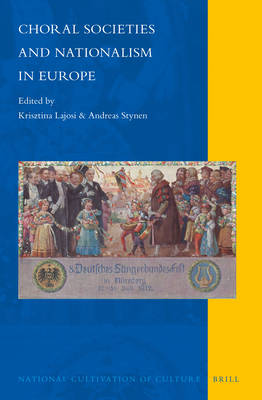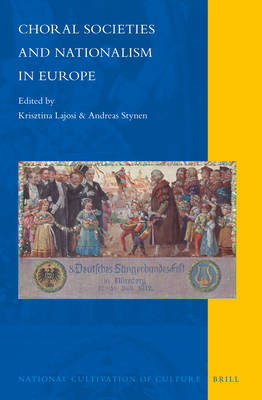
- Afhalen na 1 uur in een winkel met voorraad
- Gratis thuislevering in België vanaf € 30
- Ruim aanbod met 7 miljoen producten
- Afhalen na 1 uur in een winkel met voorraad
- Gratis thuislevering in België vanaf € 30
- Ruim aanbod met 7 miljoen producten
Zoeken
Choral Societies and Nationalism in Europe
€ 230,45
+ 460 punten
Omschrijving
This wide-ranging contribution to the study of nationalism and the social history of music examines the relationship between choral societies and national mobilization in the nineteenth century. From Norway to the Basque country and from Wales to Bulgaria, this pioneering study explores and compares the ways choral societies influenced and reflected the development of national awareness under differing political and social circumstances. By the second half of the nineteenth century, organized communal singing became a primary leisure activity that attracted all layers of society. Though strongly patriotic in tone, choral societies borrowed from each other and relied heavily on prominent German or French models. This volume is the first to address both the national and transnational significance of choral singing.
Contributors are: Carmen De Las Cuevas Hevia, Jan Dewilde, Tomás Kavka, Anne Jorunn Kydland, Krisztina Lajosi, Joep Leerssen, Sophie-Anne Leterrier, Jane Mallinson, Tatjana Markovic, Fiona M. Palmer, Karel Sima, Andreas Stynen, Dominique Vidaud, Ivanka Vlaeva, Jozef Vos, Gareth Williams, Hana Zimmerhaklová.
Contributors are: Carmen De Las Cuevas Hevia, Jan Dewilde, Tomás Kavka, Anne Jorunn Kydland, Krisztina Lajosi, Joep Leerssen, Sophie-Anne Leterrier, Jane Mallinson, Tatjana Markovic, Fiona M. Palmer, Karel Sima, Andreas Stynen, Dominique Vidaud, Ivanka Vlaeva, Jozef Vos, Gareth Williams, Hana Zimmerhaklová.
Specificaties
Betrokkenen
- Uitgeverij:
Inhoud
- Aantal bladzijden:
- 298
- Taal:
- Engels
- Reeks:
- Reeksnummer:
- nr. 9
Eigenschappen
- Productcode (EAN):
- 9789004300842
- Verschijningsdatum:
- 1/11/2018
- Uitvoering:
- Hardcover
- Formaat:
- Genaaid
- Afmetingen:
- 163 mm x 239 mm
- Gewicht:
- 861 g

Alleen bij Standaard Boekhandel
+ 460 punten op je klantenkaart van Standaard Boekhandel
Beoordelingen
We publiceren alleen reviews die voldoen aan de voorwaarden voor reviews. Bekijk onze voorwaarden voor reviews.







